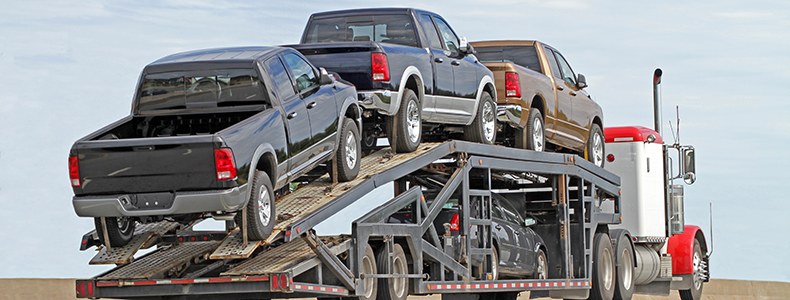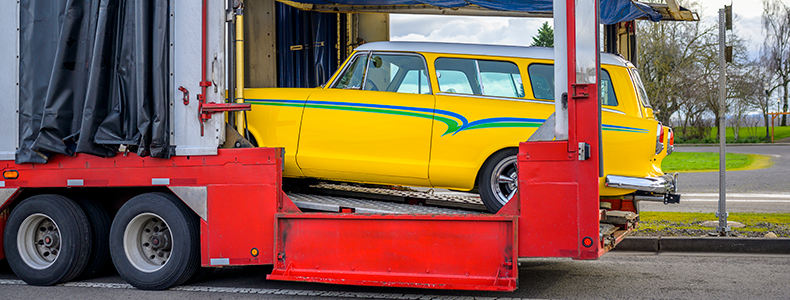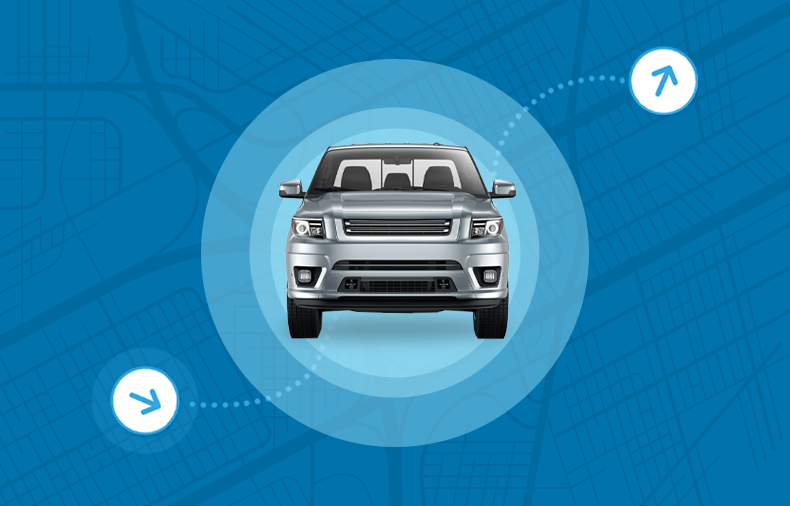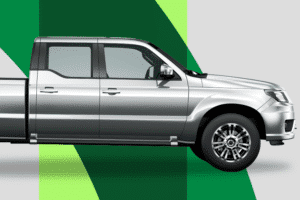Shipping vehicles long-haul comes with options. To pick what’s best for your car, truck, bike, etc., it helps to get the lay of the land on how these rides travel. This guide will walk through the main transport methods in plain terms — open transport vs enclosed transport.
We’ll go over the pros and cons of each so you can decide what fits your situation. Things like costs, protection from road debris/weather, pickup and drop-off logistics, timing for express shipping, and other factors will be covered.
There’s no “one size transports all” solution. Evaluating open and enclosed hauling choices on their merits helps ensure your wheels make the journey safely while fitting your budget. We aim to provide the facts in simple language. Of course, experts can fill in any gaps specific to your vehicle’s needs.
So let’s have a common-sense look at how to transport your baby — be it car, truck, or bike — to its new destination. Getting the right fit means comparing the basic shipping options. First up, what is “open transport”? And when might enclosed trailers be the smartest alternative?
Pampering Prized Possessions: The Benefits of Enclosed Transport
Shipping valuable vehicles calls for extra care and protection. Enclosed transport offers real benefits for keeping your ride safe during its trip. For fancy, rare, or classic cars you can’t replace, enclosed trailers give the best, most secure shipping.
Unmatched Protection & Security for Priceless Investments
Fully enclosed metal trailers provide top-level shielding so nothing damages the outside. Hard walls stop weather like hail, rain, or snow from putting dents or rust on perfect body panels. Tight screens also filter road debris that could scratch spotless paint. These trailers cocoon special cars in a protective bubble.
The barriers also mean more security. The locked box tightly limits access while driving. Only the trained driver with a key can get in. This prevents strangers from messing with the valuable cargo. With no unwanted access, your car avoids handling damage, inside scuffs, or exterior nicks.
For restored classics or luxury rides like Bentleys, avoidance of harm equals avoiding huge repair bills. And for classic car lovers, seeing flaws appear on their beloved investment is emotionally hard. Enclosed shipping lowers risks so cars arrive as perfect as when they left.
Specialized Equipment & Care for Premium Rides
Expensive rides from brands like Porsche, Rolls Royce, or Aston Martin deserve extra care since they cost as much as luxury sedans. Classic cars from the 1950s or 60s also represent priceless investments for collectors that can’t be replaced. Open truck shipping can’t give these kinds of specialty vehicles the gentle handling they need.
Instead, enclosed auto transport offers custom features to safely transport fragile, high-value cars. This includes ramps, thick padding, and soft straps that prevent outside dings when loading and tying down the cars. Temperature-controlled interiors stop moisture and mold by managing the humidity and airflow. These specialized tools create a tailored moving experience just for rare luxury and vintage models.
Open trucks treat every vehicle the same. But classics and high-end vehicles require a gentle, white-glove moving process to avoid damage. Enclosed shipping customizes the storage, climate, and handling all around these one-of-a-kind cars. Special vehicles get special treatment for safe, caring transport from start to finish.
Door-to-Door White Glove Service
Reputable enclosed shipping companies finish the fancy service by picking up your ride right from your dealer or garage. You avoid driving your flawless car to crowded shipping yards. Chauffeured door-to-door trips limit street exposure that could lower how nice your car looks or how much it’s worth.
Sometimes drivers even schedule expert detailers to give cars washes and clean-ups before drop-off. Then it’s returned looking better than when it left! For vehicles that cost a million dollars or more, that kind of white-glove care provides confidence your baby is pampered during the whole trip.
Open truck shipping treats cars like normal cargo. But for high-rolling collectors with precious autos worth more than houses, specialized enclosed trailers offer a moving experience on par with the cars’ elite status. From start to finish, your special ride enjoys red carpet treatment instead of rough handling. Besides protecting your investment, it preserves the thrill of unveiling a just-detailed exotic or classic returned-to-showroom shine.
Real-Time Tracking & Communication
Enclosed shipping companies use modern technology, too. GPS trackers allow constant cargo tracking. Owners get text or email updates about delays and estimated arrival times. This transparency gives confidence and convenience — owners always know their car’s exact location.
Luxury brands, dealers, and collectors like enclosed shipping since the pampered transport protects value. Cars stay safe in customized, gentle care from pickup to drop-off. For super-expensive wheels that cost more than mansions, enclosed trailers provide white-glove moving that million-dollar investments deserve.
Open truck hauling treats cars as normal freight. But for fancy, exotic, rare or classic rides, special treatment ensures no flaws or damage risk reducing how special the vehicles are. Enclosed shipping recognizes that when cars are priceless art, only an elite moving experience will do. So vehicles ride securely amid bespoke amenities as befits their premier status.
Open vs Enclosed Transport: A Comparison

Open transport means shipping vehicles on a multi-tier, uncovered trailer. This method is straightforward: cars are loaded onto a two-level trailer, secured, and transported. This option is ideal for standard, everyday vehicles, including family cars, SUVs, and used vehicles. While this method is safe, it exposes vehicles to weather and road elements. Cars are strapped securely but not covered, meaning they might arrive with a layer of travel grime.
Pros
- Cost-Effective: Open carrier transport is generally more economical than enclosed transport, making it a budget-friendly option for most standard vehicles.
- Higher Availability: Open carriers are more commonly used and readily available, providing more flexibility in scheduling and shorter waiting times for transport.
- More Capacity: Open carriers can transport more vehicles at once, leading to lower costs per vehicle and efficient use of resources.
- Faster Service: The popularity and availability of open carriers often translate into faster delivery times, as more options for routes and schedules are available.
- Simplicity: Loading and unloading vehicles on open carriers is generally straightforward and efficient.
Cons
- Exposure to Elements: Vehicles are exposed to weather conditions like rain, sun, and snow, which might not be ideal for specific cars, especially high-value or delicate ones.
- Less Security: While still safe, open carriers offer less security than enclosed transport as the vehicles are visible and accessible during transit.
- Vehicle Cleanliness: Cars might arrive with a layer of dirt or road grime, requiring a wash after delivery.
- Limited Special Care: Open carriers are not ideal for transporting high-end, luxury, or classic cars that require extra care and attention during transport.
Transporting Different Vehicles via an Open Trailer
A distance of 1,000 miles can attract varying costs. Below is an overview of these costs for various vehicle types based on comprehensive search findings:
- Sedan: The cost of transporting a sedan using open transport typically ranges between $550 and $1,600 for a 1,000-mile trip. This translates to an average rate of about $1.15 per mile. Another projection suggests a slightly different range of approximately $600 to $800 for the same distance, equating to $0.60 to $0.80 per mile.
- SUV or Truck: For larger vehicles like SUVs or trucks, the cost for open transport over a 1,000-mile journey also falls within the $550 to $1,600 range, similar to that of a sedan.
- Motorcycle: Shipping a motorcycle on an open trailer has a more varied cost spectrum. The average price for distances under 1,000 miles is between $180 and $300. For longer journeys exceeding 1,000 miles, the cost typically ranges from $300 to $700.
Enclosed Transport

Enclosed transport means vehicles are transported within a fully covered trailer, ensuring maximum protection. This is like a car VIP service, where each vehicle gets a premium, sheltered ride. It is ideal for high-value cars, luxury models, vintage collectibles, or any vehicle needing extra care. Enclosed auto shipping offers top-tier protection. Vehicles are shielded from weather, dust, and road debris, arriving in pristine condition.
Cost Considerations
- Vehicle Type and Size: Larger or special vehicles may incur additional costs.
- Distance of Transport: Longer distances increase fuel and logistical costs.
- Demand and Seasonality: Peak seasons may see higher prices due to increased demand.
Transporting Different Vehicles via an Enclosed Carrier
Here’s a breakdown of typical cost estimates for transporting various types of vehicles over a 1,000-mile journey in an enclosed trailer:
- Sedan: Enclosed transport costs for a sedan usually fall between $1,000 and $2,000. This equates to a rate of about $1 to $1.25 per mile.
- SUV or Truck: Given their larger size and heavier weight, SUVs and trucks are generally more expensive to ship than sedans. The enclosed transport price for these vehicles over a 1,000-mile distance ranges from $1,000 to $2,000.
- Motorcycle: The average cost in an enclosed carrier is roughly $940 for motorcycles. This figure can vary, starting at around $500 for shorter distances and going up to about $1,300 for coast-to-coast transportation.
Pros of Enclosed Carrier Transport
- Enhanced Protection: Enclosed carriers offer superior protection from weather elements like rain, snow, and sun, as well as from road debris. This is crucial for safeguarding the vehicle’s exterior and maintaining its pristine condition.
- Increased Security: Vehicles are not visible to passersby, which adds an extra layer of security. This is particularly important for high-value, luxury, or classic cars that might be targets for theft or vandalism.
- Ideal for High-Value Vehicles: Enclosed transport is often the preferred choice for transporting luxury cars, antique vehicles, and collectibles, ensuring they remain in showroom condition upon delivery.
- Reduced Risk of Damage: The enclosed space minimizes the risk of scratches, dents, or any other transit-related damage, preserving the vehicle’s value and appearance.
- Professional Handling: Enclosed carrier services often come with drivers who are experienced in handling high-end vehicles, offering expertise in secure loading, unloading, and transportation.
Cons of Enclosed Carrier Transport
- Higher Cost: Enclosed transport is typically more expensive than open transport. The added protection and specialized service come at a premium, which might not be cost-effective for standard vehicles.
- Less Availability: Enclosed carriers are less common than open carriers. This can lead to fewer options in terms of scheduling and longer wait times to arrange transport.
- Reduced Capacity: Enclosed trailers usually carry fewer vehicles at a time compared to open carriers. This lower capacity contributes to higher costs and can affect transport efficiency.
- Potentially Slower Delivery: With fewer vehicles being transported in each trip and the added care taken during loading and unloading, enclosed transport might take longer than open transport.
- Limited Accessibility in Some Areas: Due to the size and construction of enclosed trailers, there might be restrictions on where they can travel or deliver, especially in residential areas with low-hanging trees or tight streets.
Bottom Line
Choosing between open and enclosed transport hinges on balancing cost, time, vehicle type, and personal preferences. Open transport offers a practical, budget-friendly option for standard vehicles, while enclosed transport provides unparalleled protection for unique cars, albeit at a higher cost. Being informed about these options ensures a smooth, stress-free vehicle transport experience tailored to individual needs and circumstances.
Why Choose Enclosed Transport for Your Vehicle?
Here’s how enclosed auto transport helps you securely transport your vehicle over long distances.
Specialized Services for High-Value Vehicles
With 20 years of experience transporting high-value vehicles worth over $100,000, you can trust us to deliver your precious cargo safely. Our team handles hundreds of luxury and exotic car transports per year. From enclosed trailers to blanket wraps and lift gates, we have the specialized equipment to protect special vehicles.
How uShip Facilitates Enclosed Vehicle Transport
First, rest assured your vehicle will remain in caring hands from pickup to delivery.
24/7 Tracking and Updates From Start to Finish
Once your transport begins, we utilize real-time GPS tracking so you can check your vehicle’s location anytime during its journey with us.
Custom Tailored Services to Meet Your Special Needs
Not all vehicles and their owner’s needs are identical, so we offer customized enclosed transport solutions. There are carriers in our network who offer specialty equipment like gloss lift gates, air ride suspension, and even micro-climate temperature control. Be sure to note your specific shipping needs in the listing and communicate with transporters ahead of time to ensure they can provide the services you require.
Get an Instant Quote Today and Breathe Easy
On uShip, you can get an instant quote for enclosed transport when listing your shipment. Quickly filter carriers by rating, specialty equipment, and services offered to find the best match. Accept a seamless credit card payment and schedule pickup within minutes after selecting your winning bid. From pickup to delivery, your vehicle remains monitored and cared for properly.
Stop worrying and enjoy end-to-end protection and white glove service for your valued automobile. Get your instant free quote with uShip now and breathe easy knowing your vehicle’s safety is priority number one.
People Also Ask (PAA)
What is the difference between enclosed and open vehicle transport?
Enclosed transport uses an enclosed trailer to protect vehicles from road debris/weather, while open transport uses an open-air carrier. Enclosed is more secure.
How much does it cost to ship a car in an enclosed transport?
Enclosed shipping averages $600-$1,200 for a standard-sized vehicle for a 500-1000-mile trip. The cost rises with distance, vehicle size, and add-ons.
Is enclosed transport better for my luxury vehicle?
Yes, enclosed shipping provides protection crucial for high-end vehicles against weather/road impacts an open carrier can’t prevent.
How do I choose the best vehicle transport service?
Read reviews, ask about safety procedures/insurance, and choose enclosed for high-value vehicles. Get quotes from multiple services before deciding.
What are the risks associated with open vehicle transport?
Open carriers risk more road debris, sun/weather exposure, and higher odds of vandalism or theft than enclosed trailers.
Can I track my vehicle during transport?
Reputable enclosed carriers offer real-time GPS tracking and consistent delivery updates through a customer portal or mobile app.
How long does it take to ship a car with enclosed transport?
For most routes, cross-country enclosed shipping averages 5-14 days, depending on the distance and delivery timeframe selected during booking.
What kind of vehicles is best suited for enclosed transport?
High-value, vintage, classic vehicles are prime candidates. Also, ATVs, RVs, and boats can benefit. Standard vehicles can be used, but the added cost of open shipping is often not worthwhile.
Are there any additional services provided with enclosed transport?
Some companies offer added services, e.g. door-to-door shipping, lift gate, and vehicle washing/detailing before delivery. These tailored solutions ensure an ideal experience.
How do I prepare my vehicle for enclosed transport?
Clean out the vehicle, check fluid levels, disconnect the battery, provide a spare key, and list any pre-existing minor damages. These steps get your vehicle transport ready.



